Americans are a restless people, changing jobs and residences frequently. Traveling’s built into our history: Since the nation’s earliest days, people have traversed its vast distances by any means available. At the same time, we’re often suspicious of outsiders, notes Asheville busker Abby Roach, who hopped freights for eight years.
“America’s kind of a weird place,” she points out. “We celebrate people like Jack Kerouac and Woody Guthrie, but when it comes to travelers we see in our everyday lives, it kind of scares people.”
With no easy definition and few statistics, pinning down what constitutes a “traveler” is tricky. And while most of today’s hobos hitchhike or pile into vans or renovated buses, a small minority continues the tradition of riding the rails, despite great risk of personal injury, legal hassles and run-ins with violent individuals.
Under the radar
The reasons for giving up the comforts of a sedentary lifestyle are as varied as the folks who choose to do so. Roach says she left home to escape a bad environment. “I felt like, at the time, I didn’t really have much choice but to go somewhere else,” she remembers. “I wasn’t necessarily thinking I was going to go traveling. I just wanted to leave.”
Jimbo Rosario, who hopped trains for several years in the early 2000s, says the seed was planted when he was growing up in Fargo, North Dakota. “I remember being around 12 and waiting with my mom at a railroad crossing,” he recalls. “There was a slow-moving train going by, and I remember seeing two dudes riding on it. I thought, ‘Why didn’t I think of that?’ There’s romanticism in freight train hopping: It’s very Americana.”
For others, personal circumstances forced their hand. Brody Hunt, a country music collector and researcher, sometime lumberjack and self-described tramp, says a broken heart led him to the rail yard. “I was living in Asheville with the first girl I was in love with. When she left me, I didn’t have anywhere else to go, so I fell into the cradle of American railroads.”
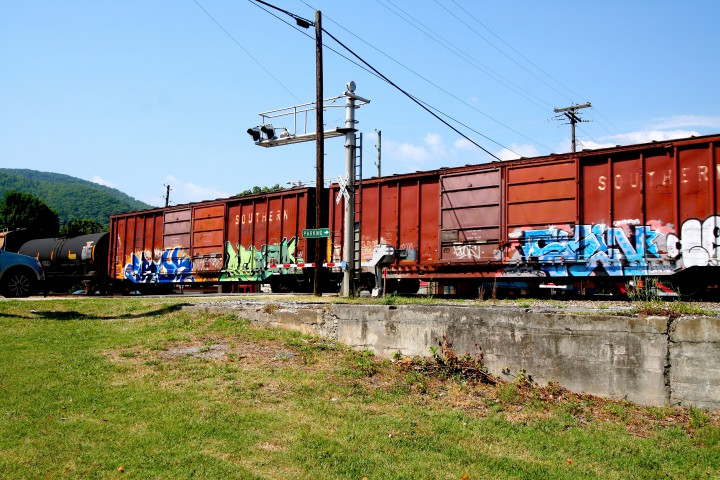
The very fact that travelers tend to fly under the radar makes it harder for outsiders to understand the subculture. “No one knows where the hobo goes,” notes Hunt. “A good hobo is never seen unless he wants to be.”
But with all the other modes of transportation available today, why hop freights? “It’s free,” says “Kosher,” who hails from Florida, “and I can damn near go just about anywhere in the country I want. I might have to get off and hitch somewhere, but you get there.”
A hobo by any other name
Outsiders might see all travelers as hobos, but within the culture there are various subdivisions: freight riders, festival kids, Rainbow Family, van riders, crust punks and thumb bums.
“It’s like a genre of music, almost,” says Tammy “Mama T” Thibodaux, who regularly houses travelers passing through Asheville in her home near Biltmore Village. “You always have your subgenres.”
Since her ex-boyfriend introduced her to traveling culture five years ago, Thibodaux has provided friends, friends of friends and sometimes hordes of relative strangers with a place to sleep, clean up and take a break from the road. “The most I’ve ever had at one time was probably about 30 people — plus all the dogs,” she says with a laugh. “It can be hectic sometimes. I try to help them out with socks, extra coats. A lot of kids do what they can — cook meals or go dumpster diving, help clean, make sure I have a beer or two.”

As in any community, however, it’s not always peace and love among travelers. “It’s like high school,” says Roach. “Train kids don’t like the hippie kids; festy kids and train kids don’t get along.”
“The rails are like any other vocation,” Hunt observes. “You can tell very quickly by how people talk about railroading how much they know and what their background is, culturally and by experience.”
There’s also a certain amount of elitism, notes Kosher. “People get mad if you talk about where a hop-out is or where to catch a train, but a lot of the hop-outs are marked anyway. It’s no big secret.”
In the end, he maintains, it’s best to steer clear of the politics. “Just ride — just hop trains and forget all that sh*t. It’s made it a lot easier for me.”
Near catastrophes
But while hopping freights may sound romantic, the reality is far more precarious. Nearly every current or former traveler interviewed was quick to note the dangers, saying they’re not advising anyone to go out and do it on a whim.
Special Agent Joe Talley, a law enforcement officer with Norfolk Southern for 10 years, lays out some of the risks.
Besides the “obvious danger of death and dismemberment,” Talley notes a litany of hazards: getting locked in a hot boxcar, having the 900-pound door slam on you, or falling asleep and falling off a moving train. “You’re riding on equipment that wasn’t designed to be ridden on,” he says. “The very nature of the railroad is unforgiving — there are no second chances.”
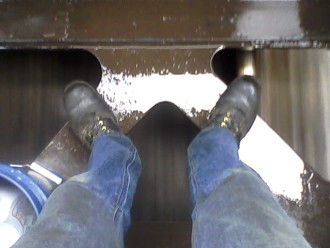
Near catastrophes are common. “That was the closest call I ever had,” remembers Hunt, pointing to a tattered boot hanging on the wall of his house. The heel “got cut off by the wheel of a train when I was wearing it. If I’d have been wearing sneakers, that would have been my heel instead.”
During the interview with Thibodaux, she gets a text from a friend who’s at the hospital with his injured girlfriend. “Her ankle got caught between the knuckle and the catwalk,” she announces to those sitting around a table in her backyard. “It’s broken.” The other travelers present merely shrug: just another part of daily life.
Even if you’re not hopping freights, though, a close encounter with one can be lethal. On April 29, a 40-year-old man who was attending the French Broad River Festival in Hot Springs was struck and killed by a train. Police said John William Gunn, aka “Sparrow,” had been drinking.
Blood on the tracks
The risks of train-hopping go far beyond the infrastructure, however. The legal repercussions, says Talley, can range from simple trespassing to unlawfully riding on the train to interfering with the railroad company’s operations. In North Carolina, the punishments can include substantial fines, several months in jail and potential federal charges.
Freight trains can also be a magnet for unsavory characters seeking to steer clear of law enforcement. “Most of the people we deal with are very good people who might just be uneducated or don’t appreciate the issues,” stresses Talley. “But there’s a smaller group of people on the tracks that send a shiver up the back.”
Robert Joseph Silveria Jr., aka “Sidetrack,” was convicted of four murders but has claimed to have killed anywhere from 28 to 47 people while riding the rails between the mid-’80s and 1996. Another, Michael Elijah “Dirty Mike” Adams, is serving a life sentence in Virginia for killing a fellow traveler; in several interviews, he’s proudly claimed involvement in at least 16 murders.

Admittedly, those are extreme cases; nonetheless, the dangers are real. Still bearing traces of bruises, Kosher pulls up a photo on his phone of himself with a badly swollen face after a fight. “I’ve been robbed, all sorts of sh*t,” he says indifferently. “You have to be a little bit guarded, watch out who you hang with on the road.”
Knowing that most travelers won’t go to the police, predators tend to single them out. “People assume that because of your lifestyle, you’re desperate for money,” says Kosher, recalling several instances where he or his then-girlfriend was sexually harassed. “We met this guy in Joliet, Illinois — he and his girlfriend started giving us all this money and were trying to get my girlfriend to come to their ‘studio,’” he reveals. “You have to deal with that sh*t a lot, traveling with a chick.”
Talley, meanwhile, says that while illicit activities such as human trafficking and drug dealing aren’t everyday occurrences, they do happen. “The illegal part of our society will use any opportunity and resource they can to further their goals,” he points out. And with only six permanently assigned Norfolk Southern police officers to cover the entire state, Talley says his agency leans heavily on local law enforcement when problems arise.
To guard against these dangers, many travelers move in groups or with a dog, and most carry some form of protection. Hunt, for instance, totes a “goon stick” when riding, often the hickory handle of a sledgehammer or maul, which are commonly found along the tracks. “I always had this rolled up in my bedroll, in case I had to do any whomping,” he explains.
For his part, Talley urges those witnessing any suspicious or illegal activity near the railroad to contact Norfolk Southern or local police. “The contact number is 800-453-2530, but you need to get in contact with the appropriate railroad,” he explains. “The easiest way to do this is go to any grade crossing: There’ll be a little blue sign, which identifies a contact number for that railroad and will also provide you with a six-digit, one-letter DOT location identifier. If you’re still unsure, then the standard is always to call 911.”
Beyond the stereotypes
Some might envision travelers as a bunch of toothless, scraggly old men or patched-up punk kids; in fact, the culture is much broader and more nuanced. “There’s a lot of folks walking about that you might not even be able to tell are travelers: professional photographers, writers, musicians,” Roach reveals. “The anarchist kids you see on the corner are actually the minority.”
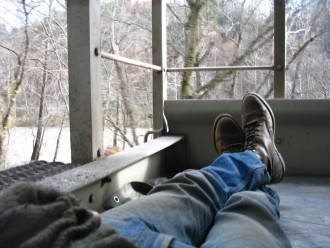
And though the perception is that most tramps are all alone in the world, many say they actually have an extensive support system. Family members may not always understand or approve of the lifestyle, but they’re usually supportive anyway. “My family thinks I’m crazy, but they’re cool,” says Hunt. “I’m definitely the black sheep, but they like me.”
Older relatives who experienced the mass migrations of the Great Depression and World War II are often more accepting of the lifestyle. “Out of all my family members, I think my grandmother, Erma, was most understanding,” Rosario recalls. “I remember being at Thanksgiving and people were asking all these dumb questions, saying why I shouldn’t be doing it. And Erma just said I reminded her of her brother ‘Shorty,’ who used to hop trains during the Depression. I thought that was really cool.”
Flying a sign
One of the most controversial and misunderstood aspects of the traveling life is how tramps make money. While many do choose to “fly a sign” (code for panhandling), many also work seasonal jobs or apply artistic talents to turn a buck.
Even among travelers, opinions about panhandling vary. Some, such as Roach and Hunt, are ambivalent about it. “I get mad at those kids sometimes, when they talk about ‘I made this much money,’” says Roach. “No, you didn’t make that much money: Other people made that money, and you took it!”
And while Hunt concedes that flying a sign is necessary sometimes, he prefers to work or borrow from friends. “If you have to beg it, beg it, but don’t steal it,” he proclaims. “I don’t have any time for that nonsense. I was a working hobo; I always had my own sh*t.”
Others point out that panhandling is harder work than most outsiders realize. “It’s a personal preference thing,” says “Gator.” “If you can’t deal with telling your story and what you’re doing there 100 times a day, then flying’s not for you.”
Many panhandlers, notes Kosher, adhere to a simple code of conduct aimed at both keeping the peace and ensuring a good spot’s continued viability. “It’s like a fishing hole: You want fish to be there,” he explains. “You don’t go out there every day. Go out and hit a lick, come back in a few days, hit another lick. After the third time, you better get out of town; people don’t want you living off of them.”
A dog’s life
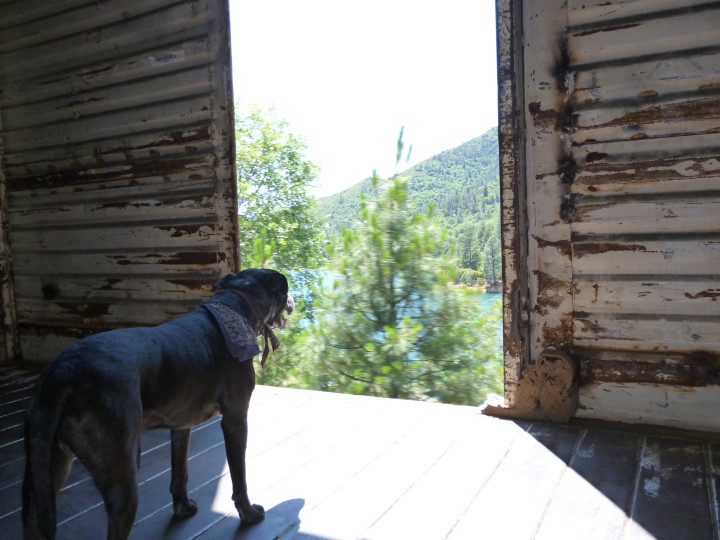
Another common point of friction with the general public concerns travelers’ furry companions. “That’s one big gripe that people have: dogs,” says Rosario.
For travelers, though, a dog can provide both protection and companionship during the long stretches of isolation; it can also dispel people’s anxiety about picking up a hitchhiker, he notes.
“I got picked up by a lot of dog lovers. I think people saw me as a boy and his dog out on an adventure, and that’s how I played it.” Having a canine compadre along for the ride, he adds, can also be a great marketing tool for the traveler trying to solicit a couple of bucks, though not necessarily in the way one might think.
“What I did was get my dog’s bowl out, or just take the bag and roll it down, so my dog was sitting next to me eating while I panhandled,” Rosario reveals. “That way, people saw that I wasn’t some scumbag — my dog was already fed. It made me money, and I didn’t want people to think I was a bad dog owner.”
And to those who say that taking a pet onto a freight or on the open road is irresponsible or abusive, his response is simple: “F–k off. Those dogs are fine. They’re not sitting home in a cage like most people’s dogs are. They’re living the best lives of any dog in the world.”
The media tease
Media portrayals of modern-day hobos often perpetuate false stereotypes, but the exposure can also have the opposite effect, says Talley.
“Anytime we have a lot of media exposure, we typically see a few more folks out there,” he reveals. “They read your article and they want to see what you’re talking about.”
Meanwhile, technology has substantially changed the way travelers operate. Where they used to rely primarily on paper maps and word of mouth, cellphones and Google Maps now provide a reliable way to scout out routes and rail yards. “You can see the whole satellite layout of the yard,” Hunt explains. “Combined with crew change information, that gives you a good battle plan going into it.”
In addition, social media such as Facebook make it easier to link up with friends across the country, enabling travelers to coordinate where they’ll be at a given time — or simply share their exploits. “A lot of these kids have serious social networking followings,” says Roach. “They’re celebrities in their own right, at least among the traveling community.”
For some travelers, manipulating the media becomes a sort of game and a way to pass the time. In the A&E documentary Murder on the Tracks, narrated by Bill Kurtis, a reporter interviews a young Rosario and several members of his crew about a mysterious hobo named “Khrom,” who was reportedly murdered after beating up a guy who’d killed his dog.
“The whole story is bullsh*t, totally made up,” Rosario reveals, laughing. “My friend James decided our crew needed ‘exposure,’ so he made this crappy website about our fake leader, Khrom, and used blurry pictures of our friend Kurt, who wasn’t with us at the time. The guy who made the documentary somehow got wind of this story through the fledgling internet and contacted James, and we got on TV!”
Welcome to Asheville
Watch a documentary or read an article about traveling culture, and there’s a good chance that Asheville will be mentioned. The city’s thriving tourism and arts scenes make it a logical destination for travelers, notes Roach.
For many, busking provides an easy way to make enough money to keep moving. “Although the two cultures are different, they run side by side,” she explains. “A lot of travelers become some of the best buskers ever, because they have to play music for their survival.”
A guitar can also allay suspicions, says Hunt. “It looks like any country album cover from the ’50s or ’60s. There’s a certain nostalgia there, which can kind of help you in the view of the public.”
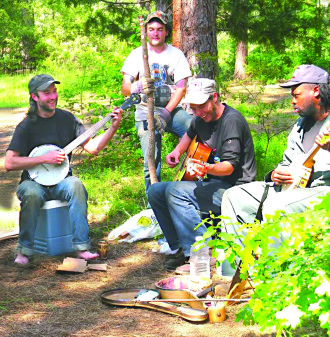
But Asheville’s increased popularity among travelers has also had its downside. “Asheville’s tramped out in a lot of ways, from people on the rails and mostly not on the rails,” Hunt maintains. “I don’t even try to busk here anymore.”
Travelers often get blamed for other people’s behavior, says Roach, because they stick out. “A lot of those folks you see floating around Pack Square aren’t travelers: They live here,” she says. “That’s a misconception. People don’t know what a traveler is.”
Kosher says he avoided Asheville altogether for many years. “The Appalachian Mountains are real pretty, but I don’t understand some of the people here,” he says. “When I fly a sign in town, there’s people yelling ‘Get a job!’ out their car window, threatening to kick my ass and stuff.”
Wearing thin
One way or another, road life does take its toll. “My back hurts now, and I don’t think I’m gonna do it anymore,” says Roach, who’ll be sharing her stories from the rails at a July 14 show at Trade and Lore Coffee. Sciatic nerve pain, which she attributes to carrying a heavy backpack for so long, is a common ailment among freight riders, as are nutritional deficiencies.
Some leave the lifestyle to pursue other interests. Disaffected by the changing culture and the increasing violence he saw among younger travelers, Rosario turned to touring with bands before eventually settling down in Swannanoa. “All these years later, it seems like it was a whirlwind,” he explains. “At the time, I thought I’d never stop doing it, but then a year later, I decided I like clean clothes and a bed.”
And while some of his old companions are still living the hobo life, many have since settled into successful careers. “[My buddy] James writes a magazine; Harry’s a chef; Cody runs a karaoke business,” says Rosario. “I write and make these little movies. I think, without all that experience, I wouldn’t be as creative as I am now.”
Similarly, Hunt quit riding the rails full time three years ago to start work on an extensive discography of vintage hobo music. “I can actually say I’m the world’s expert on pre-World War II hobo music on the f–king planet, thanks to a lot of really cool old guys,” he says. And though he still takes periodic trips, “I’d just been doing it for so long, so much. It wears on you, and it just wasn’t that much fun anymore. I love being out on the rails — always will — but the thrill has been gone for a very long time.”
Others, like Gator, don’t plan to go back to the daily grind any time soon. “I know people in their 70s that’ve been traveling since they were teenagers,” he says. “Ain’t no other way to live: You see something different every day if you want.”
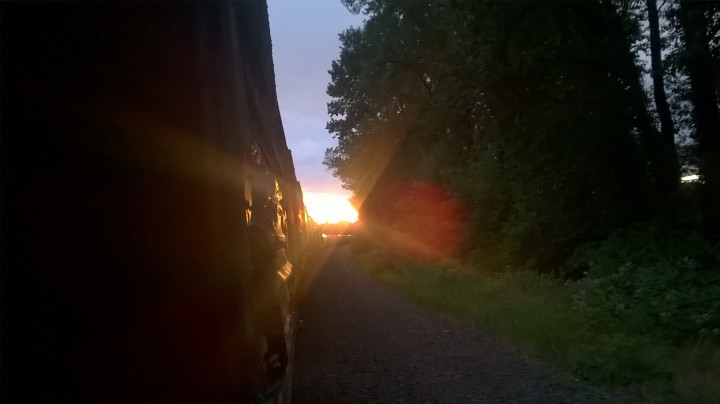
Rewards of the road
But regardless of whether they’re still actively traveling, those who’ve made their way by rail and by thumb say the experience has profoundly changed their perspectives on life, on America and on how they fit into it all.
“What these kids are doing is very American,” Rosario contends. “This rugged American ideal, that’s what’s happening here. I’ve seen the wonderful things that people are capable of and some of the horrible things people are capable of.”
In the process, deep friendships are often forged, notes Kosher. “A lot of my friends and family who’ve been in the military talk about how you form a bond with someone out there. Most of the people I’ve traveled with have been generous, good-hearted people. I’d do anything for them.”
For his part, Gator says choosing to live on his own terms has afforded him opportunities most folks never have — or lack the courage to pursue. “I’ve talked to 70-year-old people that haven’t ever left their home state,” he points out. “I’m 33, and I’ve been to 47 of 50 states; I’ve stepped foot in Canada, I’ve stepped foot in Mexico; I’ve seen every one of the islands down in the Keys; I’ve been in a boat all the way around the coast.
“Everyone always says they’re stuck somewhere,” he adds. “You’re not: Just get out and walk. You don’t need much. If I have food, water and a place to lay down where I don’t get woken up by the police, I had a good f–king day.”




I’m not quite sure what to think about the content presented in the article. While the article itself is well written for Asheville standards, it leaves me with questions:
Preface, yeah, I don’t ‘get it’.
I’m a ‘square’ who rents a house and gets physical mail delivered too. When I pee off my deck I’m not in physical danger of falling off a fast moving object made of steel weighing thousands of tons. My questions, however, still are valid.
– Is Woody G. really a valid example of why modern folks hop trains? During Guthrie’s time, America suffered from a GOP (Hoover) inspired financial depression that resulted in over 25% unemployment as well as the largest (at the time) man made environmental disaster ever perpetrated- The Dust Bowl. As to Kerouac, should I ask when any hobo author’s next “Great American Novel” will be available to us suckers who don’t travel that way? I would look forward to reading it.
-Am I the only one who reads about train hoppers being on Facebook and starts laughing until coffee comes out my nose?
– How does one become an “archivist” or “world’s expert” of Pre WWII hobo songs? Is an International Hoity Toity Society of Archivists card involved or is that label self annointed? Joe Bussard of Frederick, MD might disagree with said claim, by the way.
-To what extent is there danger for females who train hop? ‘Kosher’s’ comment about travelling with “chicks” speaks volumes.
-How the hell do you teach a dog to hop a moving train? As they recognize dumb decisions made by humans on a daily basis i.e. burglar/stranger in the house/always knowing when a zombie or monster is nearby in horror movies, how do their human masters bribe them to do that? And what sort of moron assumes that every dog in a non train hopper’s home is kept in a cage all day? I do admire the dogs that have to be part of the pack that way, as they don’t speak and probably roll their eyes when dinner time happens for dumpster dived cuisine.
My questions do not imply that I agree or not with that lifestyle, I’m just a dude with a house who wonders.
Was waiting for you to show up , BR. Thanks for reading and for the (slightly backhanded) compliment on my writing! Your questions are definitely valid. The point of the article was to help promote some understanding of why people choose to do this and dispel some of the common stereotypes people seem to have when they see these folks on the road or around town.
1. I think Roach’s point with the Woody/Kerouac quote was to say that America has this nostalgia for the freedom embodied by hobo lifestyles as depicted in popular music/writing, yet we tend to assume certain things about the folks doing it nowadays. Obviously, historical circumstances were different, but I’d say the underlying drive is similar. Re: Kerouac’s need to “Go” and idolization of Neil Cassidy, who was much more the tramp than novelist.
2. Everyone’s on social media nowadays.
3. You’d have to take that up with Mr. Hunt (the other one). He’s cataloged quite an impressive discography of this stuff, and has worked with other archivists in that field.
4. Again, you’d have to take that up with a female trainhopper. From my interviews and research, both men and women face similar risks of bodily injury and predatory creeps. I’d imagine that women may have to deal with the latter a little bit more often, as a result of the way women are treated by our society in general.
5. I think you’re taking Rosario’s point too literally. I don’t think he meant every dog that lives in a house must live in a cage. He’s speaking to the perception that because these folks are “homeless,” they must not be good dog owners, which is by and large untrue. Most of the people I spoke with make sure their dog has dog food (not “dumpster dived cuisine,” real dog food) before they think about spending money on themselves.
As to how they train the dogs to get on and off the train, you’d have to ask one of them.
I believe I was slightly misquoted, or slightly mispoke. I only collect and really know, and am primarily interested in, commercially recorded pre war hillbilly 78’s. My two areas of expertise, are country “hobo/bum songs” and 78’s made by musicians from the greater Asheville area. With the help of many of the greatest collectors in the world, and primarily through the work of Tony Russell and Bob Pinson and their massive “Country Music Records”, I’ve compiled the only discography on the hillbilly hobo subject.
Clearly Joe is an icon and a damn national treasure. Joe knows more about many genera of 78’s than virtually anyone ever will. What I have done however, is compile a focused discography. A very time intensive and difficult thing to do. It’s not like every “Hobo” song (by my parameters) has a telling title. But, since you and everyone else with a computer seems to know who Bussard is, you may also be aware that there are very tight circles and circuits of information, amongst the 78 collectors and researchers of the world, and I have made it my business to gain full access to those minds.
Bussard is not the expert on everything. He knows a hell of hell of a lot, and all collectors are indebted to him, among many other pioneers, in and out of the public eye. For example, it is safe to say Marshall Wyatt of Old Hat records, my hero, mentor, and I’m proud to say friend, is pretty much the child to fight on pre war 78’s made by musicians from The Old North State.
It has come to the point, when my peers make a discovery, or have a question, regarding said subjects that I’m focused on, they will often times refer to me. That is all I meant by my flamboyant statement. But it is what I HAVE to be, as I am working on the first reissues of their kind, and the fine minds that assist me, would expect nothing less. Not to mention the labels.
I hope this is a good brief explanation. Should you be such a fearless critic in what you may dabble in, but now nothing about. You should have asked to come over and listen to rare unreissued 78’s.
Country Musically,
Brody Hunt
Forgot to mention I am not an archivist by any definition. I am a collector and researcher.
Dude, fact check any interview the X does on before publication.
Otherwise, well you know.
Thanks for clarifying Brody. I don’t think I misquoted anyone, but I apologize if you feel the quote was taken out of context. I have updated the article here to reflect that you are a collector and researcher, not an archivist. My mistake on that one.
I appreciate your help and the clarification!
“I can actually say I’m the world’s expert on pre WWII music on the f’-in planet. thanks to a lot of really cool old guys”.
Sound familiar?
Were you
-misquoted?
-did Hunt the writer of the article force words into your mouth?
-were you the victim of a vicious smear campaign?
C’mon.
You do describe your quote as ‘flamboyant’. Sure. I’ll buy that. That does not make me a troll. I can’t believe I have to type this out loud. “Troll” is the last bastion of the thin skinned.
If you could slice an “I don’t care” into little micro slices about trains, that would be me. But puffin up about music and then backpedalling when exposed for it, well, that’s when I use the power of the pen. I mean, your comments are right there in front of me to read.
To paraphrase Aasif Mandvi, you do know we can read you right now?
As I mentioned above, Mr. Hunt (not me) is correct in the sense that I should have contextualized that comment further in the article. We were speaking about Pre-WWII commercially recorded hillbilly music. I did not dwell on that particular quote as much as I should have perhaps, because it was ancillary to the actual focus on the article. Was only meant to demonstrate what Mr. Hunt (not me again) is now devoting his time and energy towards currently.
I don’t believe he’s backpedaling at all — only clarifying, as I asked in my original response to your inquiry. And seeing as this is an article about freight riding and not someone’s credentials as a country music researcher, let’s try and get back on track. You made your point; Mr. Hunt responded. Others have vouched for his knowledge of the subject in question. I take the responsibility for not providing the context of the quote more clearly. Will try do better next time.
Also, you misquoted the actual quote. I have Hunt saying he’s the “world’s expert on pre WWII HOBO music on the f’-in planet, thanks to a lot of really cool old guys.” Not pre-WWII music in general, as you seem to suggest.
if I am moderated on this sight for never having violated the Mtn X terms of service for posting or had comments removed or having been banned, I’m both curious, flattered and doubting that anyone waits for me to show up. Caffeine fuels my posts unless a local brewery would care to intervene.
I caught the funny you made about Hunt, by the way. Mike was dead to me after the Simpsons stole m best material.
Nice work with the article. I’ve wondered if there would ever be a ‘tell all’ article, but it is a sort of closed society.
As to a label of backhanded, see first paragraph.
For the dog thing, how do you toss a dog onto a moving train? Still wondering.
– Site, not sight. Spell check dumbs us down again.
No, btw, not everyone is on social media. Human society functioned passably pre Zuckerberg. It has not improved since then.
Mental health professionals refer to social media addiction as a mental disorder ‘nowadays’, post thinking.
I was being a bit hyperbolic. Social media is a mixed bag for sure, but I think it’s fair to say it’s a pretty common part of many people’s (at least many American’s) lives.
I have my funny moments. No comment re: Mike, except I’m glad my parents weren’t cruel. Back to the article: It’s definitely a closed society to an extent — a lot of these folks have to be guarded due to nature of what they’re doing. If a “tell all” sort of article or book were to come, it’d most likely be from someone within the culture itself. An outsider like myself can only glean so much.
My understanding is that most people try to avoid getting on or off a train moving with any sort of real momentum when at all possible. That’s an easy way to get killed or hurt. For those traveling in groups, I’ve heard a dog is usually passed up to someone already on board from someone still on the ground, but I can’t speak with any real authority on that or what folks do when it’s just them and a pup.
FYI, Abby Roach and a couple other folks who’ve traveled some will be sharing personal stories July 14 at Trade & Lore Coffee downtown. While I don’t think they’re going to offer any “how-tos,” they might be able/willing to answer some of the specific questions I’m not able to.
Man, it’s rough when the funny bone is removed. Otherwise, how does one take an online section for comments seriously?
Good question! Or life for that matter. I was never very good at Operation, though. Always went for the Breadbasket big money. Funny bone was small potatoes.
Speaking as a lady who hitchhiked and hopped trains around the country for many years always with a dog by my side, I will look past what I interpreted to be a slightly condescending tone to answer your questions that relate to me…
First, I know very few people that hop “on the fly” (catching a moving train) with their dogs. Those that do usually have smaller dogs so they can carry them in their arms. Dogs are not ever expected to jump on a moving train all by themselves! That would be far too dangerous, and we travelers care way too much about our companions to ask that of them. I, myself, have a 70 lb pit bull, who’s 9 years old and spent her whole life on the road until we retired last year (and my decision to retire was partially because of her advanced age). She’s never caught on the fly, nor would I ever even consider doing that while traveling with her.
As to your concerns about traveling women, don’t worry, we’re fine. I started traveling alone, at the age of 17, and I learned very quickly how to take care of myself. One thing that you will learn very quickly if you spend any time hanging out with transients, is that us ladies are not to be fucked with! Haha. I’ve dealt with some creepy encounters, especially during late nights at truck stops or anywhere that drunken tourists congregate, but I think most of my male friends have dealt with the same, if not worse.
Hope some of your curiosity has been satisfied!
Yes- thanks! Finally for the dog getting on a train explanation.
Having conducted oral history interviews of (mostly) younger hobos (one was 95) for the past couple of years at a west coast hobo gathering, I can attest to Brody Hunt’s knowledge and love of traditional hobo music. While we see the world change it is good to know that there are still young Americans who are willing to step outside the norms to see the “elephant”. Although not the next great American novel, I recently published Ramblin’ Boy, a memoir of three young men from about 1962-72. You can find it on Amazon if you’re lazy (Bezos gets the big slice of pie) of by finding me. I’m getting a little long in the tooth to be riding the long hops, but even a “40 miler” still gives me a thrill. The article seems pretty accurate to me; I’ve seen a lot worse.
Hey Daniel! Thanks for reading, commenting and sharing. I’d be very interested in getting a copy of your book. Would rather give you the money than Amazon though. Are you around Asheville? Feel free to email me at mhunt@mountainx.com and let me know the easiest way to grab a copy!
Cool. The article itself illuminated a cross section of pickers who I like their style, but do not subscribe to the lifestyle as it is a bit precious and insular for my taste. Live and let ride (the rails).
I’m still stuck on Joe Bussard for music however as I used to attend his Saturday afternoon ‘service’ on WNCW like clockwork. I’d dub music from his collection (over 15,000 records of scratchy poppy stuff) onto cassettes to drive around to. WNCW then nixed his show as he wasn’t ‘sexy’ (aka listener #s and fund drive donations) enough like pop Nashville newgrass and Allison Krauss/Robert Plant albums masquerading as good n’ country. R. Crumb and Clint Eastwood would be my other 2 favorite collectors/archivists.
I asked my dog last night if she’d like to hop a train with me after reading/commenting on this article, and she rolled over on the couch, farted and scratched behind her ear. I took that as a no. Who am I to doubt the smartest animal in the house?
Interesting article Max and thank you for presenting their story . I became aware of the traveling culture through Abby Roach, who does a Busker show and brings in troubadours to the radio studio who pass her high musician standards. It’s been fascinating to learn of their passion for old time, non commercial music and how they are working to preserve it for future generations..
Boatrocker, most of the travelers are “connected ” to social media via cell phones, but some travel with laptops….I know Abby Roach did, and in the process collected a huge library of old timey and other types of music from other travelers. A very interesting subculture.
Thank you for reading and commenting Davyne!
sorry, 1930’s hobos left signs for each to each other via little hand drawn symbols signifying whether it was ok to camp in an area for the night and alerting others to the presence of RR bulls. A laptop or social media? Way to leave home for the freedom of the rod unencumbered by the social norms of society.
Old timey is a form of music invented by WNCW and farmers’ markets staffed by those whose music tastes are defined by Pete Seeger.
It is correctly pronounced
‘country music’, whether for whites, blacks or whomever. When bluegrass hit the airwaves (aka the first country pop music), the stuff before it needed a cute label do differentiate.
Though I do appreciate your history of music lesson as preached by folks with laptops. I do admire your posts but have to go the mat for this.
Connected is what social media addicts are not.
Mr. Boatrocker: Once again, you speak with confidence about what you know nothing about. The “signs” left by “1930’s Hobos” are the biggest farce in the history of bumming the freights. I have never heard one one actual hobo researcher (of which I am not, but I am a hobo and have known ‘boes who hit the pike in the early ’30s) that has ever displayed ANY confidence in their actual use and existence. No doubt, ‘boes would leave marks and signs at times for their fellow knights of the road, and do to this day, but the idea of some kind of secret language, and a system of understood and fairly standardized symbols, as has been displayed countless times and bever seems to die, is an utter myth of which there is zero historical evidence for. Furthering your expressed lack of any knowledge regarding what you are stating, the 1930’s was a period of death in legit tramp/hobo culture. A time when if any such “secret code” language did exist, it would have been rapidly disappearing. But, the idea seems to capture the minds of people, and fools who don’t know signal cabin from a tie plate, will go on touting them as a historical fact. I even have a bandana made with them printed on it. Also hoboes are adaptable creatures. Should they not ride “modern” 48′ well cars or hoppers because they haven’t been around since the 1920’s? I rode most of my time with out any cell phone or connection to the internet. Then when it began to become available, I would call my hombre, with his “eye in the sky” google maps, and we’d figure something out. Some of the oldest tramps I know who are still riding today, are proud as hell of the GPS on their phone. There is plenty of hiking down the pike remaining I assure you. Pretty much, go troll on another post. I’m tired of writing these responses. But as long as you continue to preach falsehoods, I may be detained. If you would like to actually educate yourself, I would recommend Roger A. Bruns’ Knights of the Road:A Hobo History. P.S. “hobos” is usually and correctly spelled “Hoboes”.
Stay Off The Tracks,
Brody Hunt
And, “Old Time Melodies” and it’s variations was first used to describe vernacular string music, by record companies in their catalogs in the late 20’s. It wasn’t just made up by Seeger and Co. Yet another falsehood you are wielding….
“Rainbow Quest” much?
“Turd of a man” much?
What what what?
http://ashevillegrit.com/when-you-see-bum-trash-and-tags-everywhere-that%E2%80%99s-where-you-sit-and-wait-train%E2%80%9D-look-inside-eternal
Signs- 2 posters disagree-
How ever shall we tell the diff between 2 ‘experts’ for 2 different wanna be papers?
Here’s hoping you both ride suicide.
We need more pickers who bathe and can work the circle of 5ths.
it’s in his name. guy is here to nitpick, nag, whine, disrupt and distract. watch the multiple failed attempts to teach multiple proverbial grandmothers how to suck eggs. yawn. /ignore boatrocker. excellent, even-handed article and postscripts from the Hunts.